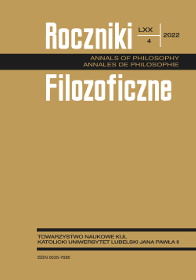Spinoza’s Critique of Religious Intolerance
Abstract
This article presents a new interpretation of Spinoza’s account of religious intolerance. According to Rosenthal and Steinberg Spinoza explains the origins of religious intolerance in two ways. The first is in the Ethics, which is grounded on the affect of ambition; the second in the Theological-Political Treatise, which is based on the opposed affects of fear and hope. I agree with this interpretation, yet I considerably modify and supplement this account. The interpretation I propose rests on the observation that in order to understand Spinoza's view we need to draw the subtle distinction between the explanation of the psychological causes of religious intolerance and the elucidation of why religious intolerance appears to appeal so much. First, I shall discuss Spinoza’s account of the origin of religious intolerance. Second, I shall consider the measures which, in his view, should be taken in order to curb religious intolerance effectively.
References
Van Bunge, Wiep. Spinoza Past and Present. Essays on Spinoza, Spinozism, and Spinoza Scholarship. Leiden: Brill, 2012.
Van Cauter, Jo. “Spinoza on Revealed Religion and the Uses of Fear.” Journal of Early Modern Studies 9, no. 1 (2020): 99–120.
Curley, Edwin, ed., trans. Collected Works of Spinoza. Vols. 1–2. Princeton, NJ: Princeton University Press, 2016.
Curley, Edwin. “‘I Durst Not Write So Boldly,’ or, How to Read Hobbes’ Theological-Political Treatise.” In Hobbes e Spinoza, edited by Emilia Giancotti, 497–593. Naples, 1992.
Della Rocca, Michael. Spinoza. New York: Routledge, 2008.
Dijn, Herman de. “Spinoza and Religious Emotions.” In Religious Emotion. Some Philosophical Explorations, edited by Willem Lemmens and Walter van Herck, 105–119. Newcastle: Cambridge Scholars Publishing, 2008.
Dijn, Herman de. “Spinoza and Revealed Religion.” Studia Spinozana 11 (1995): 39–52.
Descartes, René. List do Voetiusa. Translated by Joanna Usakiewicz. Warsaw: Wydawnictwo Naukowe PWN, 1998.
Garber, Daniel. “‘A Free Man Thinks of Nothing Less Than of Death’: Spinoza on the Eternity of the Mind.” In Early Modern Philosophy: Mind, Matter, and Metaphysics, edited by Christia Mercer and Eileen O’Neill, 103–18. Oxford: Oxford University Press, 2005.
Garber, Daniel. “Anthropomorphism, Teleology, and Superstition: The Politics of Obedience in Spinoza’s Tractatus Theologico-Politicus.” In Spinoza in Twenty-First-Century American and French Philosophy: Metaphysics, Philosophy of Mind, Moral and Political Philosophy, edited by Jack Stetter and Charles Ramond, 297–310. London: Bloomsbury Academic, 2019.
Hsia, Ronnie Po-Chia, and Henk van Nierop, eds. Calvinism and Religious Toleration in the Dutch Golden Age. Cambridge: Cambridge University Press, 2002.
Israel, Jonathan I. The Dutch Republic: Its Rise, Greatness, and Fall, 1477–1806. Oxford: Oxford University Press, 1995.
Israel, Jonathan I. Enlightenment Contested. Oxford: Oxford University Press, 2006.
Israel, Jonathan I. “Religious Toleration and Radical Philosophy in the Later Dutch Golden Age (1668–1710),” in Hsia and van Nierop, Calvinism and Religious Toleration, 148–58.
James, Susan. Spinoza on Philosophy, Religion, and Politics: The Theologico-Political Treatise. Oxford: Oxford University Press, 2012.
James, Susan. Spinoza on Learning to Live Together. Oxford: Oxford University Press, 2020.
Kołakowski, Leszek. Świadomość religijna i więź kościelna. Studia nad chrześcijaństwem bezwyznaniowym XVII wieku. Warsaw: Wydawnictwo Naukowe PWN, 1997.
Laerke, Mogens. Spinoza and the Freedom of Philosophizing. Oxford: Oxford University Press, 2021.
Malcolm, Noel. Aspects of Hobbes. Oxford: Oxford University Press, 2002.
Matheron, Alexandre. Individu et communauté chez Spinoza (Paris: Minuit, 1969).
Melamed, Yitzhak Y., and Michael Rosenthal, eds. Spinoza’s Theological-Political Treatise. Cambridge: Cambridge University Press, 2010.
Ogonowski, Zbigniew. Z zagadnień tolerancji w Polsce XVII wieku (Warsaw: Państwowe Wydawnictwo Naukowe, 1958).
Nadler, Steven. Spinoza. A Life. Cambridge: Cambridge University Press, 1999.
Nadler, Steven. Book Forged in Hell: Spinoza’s Scandalous Treaties and the Birth of the Secular Age. Princeton, NJ: Princeton University Press, 2011.
Rutherford, Donald. “Spinoza’s Conception of Law: Metaphysics and Ethics.” In Melamed and Rosenthal, Spinoza’s Theological-Political Treatise, 143–67.
Rosenthal, Michael. “Tolerance as a Virtue in Spinoza’s Ethics.” Journal of the History of Philosophy 39 (2001): 535–57.
Rosenthal, Michael. “Spinoza’s Republican Argument for Toleration.” Journal of Political Philosophy 11 (2003): 323–37.
Steinberg, Justin. “Spinoza’s Curious Defense of Toleration.” In Melamed and Rosenthal, Spinoza’s Theological-Political Treatise, 210–30.
Steinberg, Justin. Spinoza’s Political Psychology: The Taming of Fortune and Fear. Cambridge: Cambridge University Press, 2018.
Swieżawski, Stefan. Dzieje filozofii europejskiej w XV wieku. Vol. 7, U źródeł nowożytnej etyki. Filozofia moralna w Europie XV wieku. Kraków: Znak, 1987.
Van den Wall, Ernestine. “The Tractatus Theologico-Politicus and Dutch Calvinism, 1670–1700.” Studia Spinozana 11 (1995): 201–26.
Copyright (c) 2022 Roczniki Filozoficzne

This work is licensed under a Creative Commons Attribution-NonCommercial-NoDerivatives 4.0 International License.





